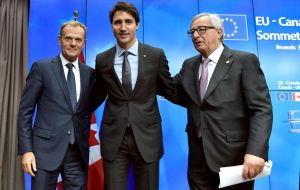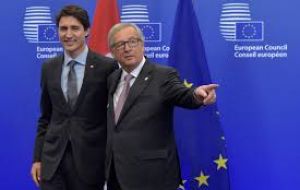MercoPress. South Atlantic News Agency
EU and Canada sign free trade accord, but has to clear 40 European parliaments
 Canadian PM Justin Trudeau (C) signed the treaty along with heads of EU institutions, a step that should enable a provisional implementation of the pact early in 2017.
Canadian PM Justin Trudeau (C) signed the treaty along with heads of EU institutions, a step that should enable a provisional implementation of the pact early in 2017.  “We are setting standards which will determine globalization in the coming years,” European Commission President Jean-Claude Juncker told a news conference
“We are setting standards which will determine globalization in the coming years,” European Commission President Jean-Claude Juncker told a news conference  EU Trade Commissioner Cecilia Malmstrom said TTIP talks are not dead, contrary to what some politicians in Germany and France have said
EU Trade Commissioner Cecilia Malmstrom said TTIP talks are not dead, contrary to what some politicians in Germany and France have said  Not everybody is happy with CETA, despite arguments from supporters who say it will increase Canadian-EU trade 20% and boost the EU economy by 12bn Euros
Not everybody is happy with CETA, despite arguments from supporters who say it will increase Canadian-EU trade 20% and boost the EU economy by 12bn Euros The European Union and Canada signed a free trade agreement that aims to generate jobs and growth though it must still clear some 40 national and regional parliaments in Europe in the coming years to enter fully into force. Canadian Prime Minister Justin Trudeau signed the treaty along with the heads of EU institutions, a step that should enable a provisional implementation of the pact early in 2017 with the removal of most import duties.
The Comprehensive Economic and Trade Agreement's (CETA) passage has not been smooth. French-speakers in southern Belgium, a minority within their own small country and accounting for less than 1% of the 508 million EU consumers likely to be affected by CETA, raised objections that held up the deal until a breakthrough, confirmed by regional parliamentary votes on Friday.
“We are setting standards which will determine globalization in the coming years,” European Commission President Jean-Claude Juncker told a news conference alongside Trudeau. “Nothing in other trade agreements will be able to remain below the level of what we have reached today with Canada.”
The Canada agreement is seen as a springboard to a larger EU deal with the United States, known as the Transatlantic Trade and Investment Treaty (TTIP), which has been the target of labor unions and environmental and other protest groups.
EU Trade Commissioner Cecilia Malmstrom said TTIP talks are not dead, contrary to what some politicians in Germany and France have said, but would need to wait for the next U.S. president — who will take office in January — to resume.
Supporters say CETA will increase Canadian-EU trade by 20% and boost the EU economy by 12 billion Euros a year and Canada's by US$9 billion. For Canada the deal is important to reduce its reliance on the neighboring United States as an export market.
For the EU, it is a first trade pact with a G7 country and a success plucked from the jaws of defeat at a time when the bloc's credibility has taken a beating from Britain's vote in June to leave after 43 years of membership.
Around 100 anti-globalization protesters clashed with police outside the venue in Brussels, trying to break down barriers in front of the main entrance and hurling red paint.
Assuming the European Parliament gives its assent, CETA could come into force partially early next year. However, full implementation, which would include a contentious investment protection system, will ensue only after clearance by more than three dozen national and regional parliaments.
The Belgian experience shows this outcome is no given, but Trudeau said provisional application would unlock 98% of CETA's key measures and that consumers and businesses would immediately feel its benefits.
”We are confident that demonstrating that trade is good for the middle classes (...) will make sure that everybody gets that this is a good thing for our economies and that it is also a good thing for the world,“ Trudeau said.
The main focus of protests against CETA and TTIP remains the system to protect foreign company's investments. Critics say its provision for arbitration panels to rule on disputes with states can be abused by multinational companies to dictate public policy, such as on environmental standards.
The EU and Canada say their investment protection system guarantees the right of governments to regulate, make use of independent judges and be more transparent.
The deal will eliminate tariffs on almost 99% of goods. The beneficiaries would include, for example, carmakers or the EU textile sector, for which Canadian duties of up to 18% can be imposed at present.
Service companies could also benefit and EU companies would be able to tender for public contracts at Canadian provincial and municipal level, the first time Canada has offered this. Canada would be able to send larger quotas of pork, beef and wheat to the EU market, and EU dairy producers would be able to export more than double the current amount of ”high quality” cheeses to Canada.




Top Comments
Disclaimer & comment rules-

-

-

Read all comments“The European Union and Canada signed a free trade agreement that aims to generate jobs and growth though it must still clear some 40 national and regional parliaments in Europe in the coming years to enter fully into force.”
Nov 07th, 2016 - 02:28 pm +1There will be holdouts until Juncker (if he is still above ground and President) bribes them or blackmails them to sign.
And the Remoaners want to keep a single market and all the immigration that goes with it.
Hard Brexit or a general election (having repealed the LibDem Faustian Pact).
The Unmighty EU will almost certainly screw it up,
Nov 07th, 2016 - 08:20 pm +1Red tape , incompetence , corruption ,
And yet again this year the EU has failed to be signed off.
Still, lets await and see if it all unravels.
What are Some of the Other HIDDEN LIABILITIES that the GLOBAL CORPORATE ECONOMY is SHIFTING to the 'harmless' TAXPAYERS & NON-SHAREHOLDERS?
Nov 05th, 2016 - 08:54 pm 0Do CORPORATE CANADA (EAST - TRUDEAU) & CORPORATE EUROPE Need the TAXPAYERS to FORGET that the CETA (EU- Canada) is the BACKDOOR for U.S. with its BRANCH PLANTS in CANADA, the EU, et al?
During the 1980's the U.S. government declared that its Branch Plants in other countries would No Longer be 'Good Corporate Citizens of the Host Countries'. That is to say; if the U.S. wants to punish another country by an embargo, or, pressure another country for its business 'friends' in 3rd party countries, then, not only will American companies in the U.S. be not able to sell to the punished country, but, American Branch plants in Canada, Europe, et al, will also not be able to sell to the punished, or, pressured nation. Therefore, thousand upon thousands of workers in Canada, the EU, et al, would be thrown out of work to satisfy the capriciousness of 'American' foreign policy.
***
FULL Article, see; Google
Commenting for this story is now closed.
If you have a Facebook account, become a fan and comment on our Facebook Page!